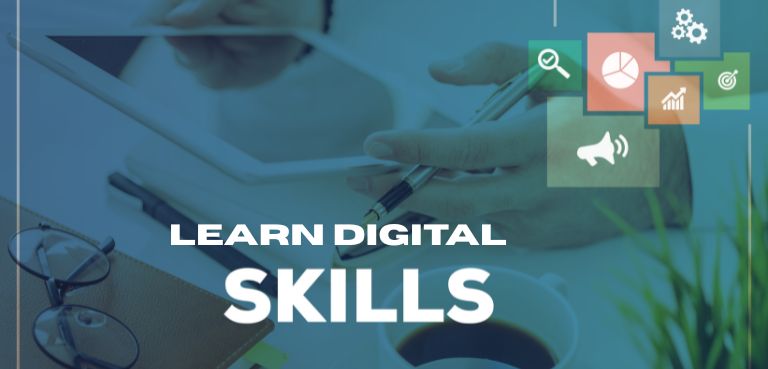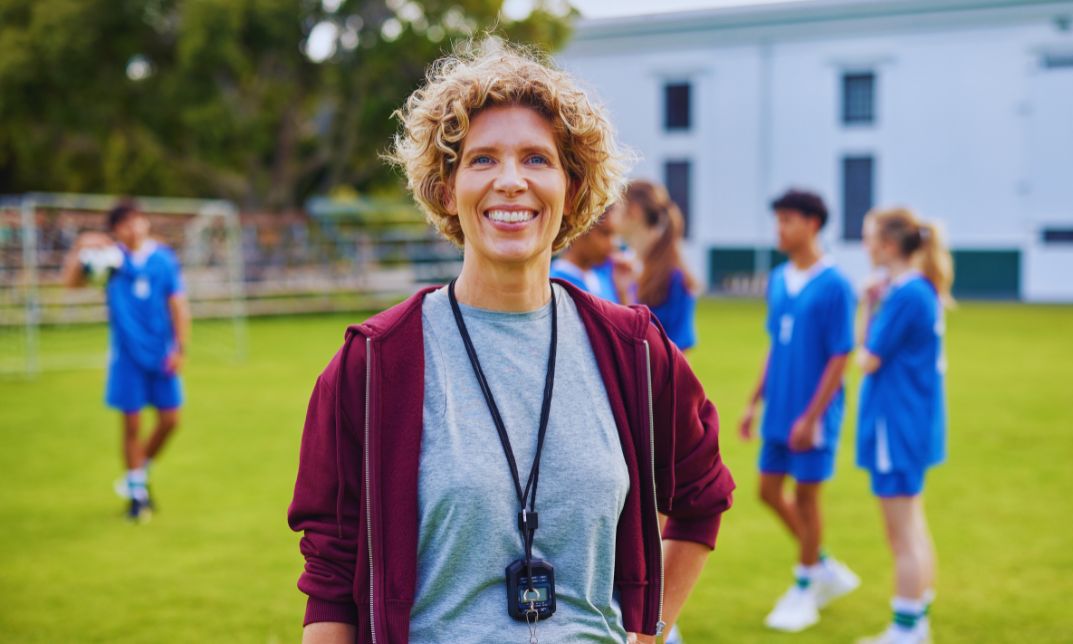No products in the basket.
How do beginners learn digital skills? They start small, stay consistent, and build confidence with each little win. That’s the secret.
You don’t need to “get good at tech.” No course, no degree, no fancy device required. You just need to try one thing. Just one. Then try it again. Maybe mess it up. Maybe laugh about it. Then do it better tomorrow. If you can copy and paste, you’re already learning. If you’ve ever sent a WhatsApp message, you’ve already begun.
This blog shows you how to start and—more importantly—how to keep going.

Why Digital Skills Matter for Everyone in the UK
Digital skills aren’t just for tech jobs. They’re for life. Booking a GP appointment. Applying for a job. Helping your kids with schoolwork. Paying a bill. Shopping for groceries. These things all happen online now.
In the UK, over 11 million adults don’t have basic digital skills. That’s a huge number. And it’s holding people back—from jobs, services, and connection. You don’t need to be a tech wizard. You just need the basics. Once you learn them, life gets easier. That’s a fact.
Start Where You Are (Yes, You’re Already Learning)
Many people think they’re starting from zero. But that’s rarely true. If you’ve ever used a phone, you’ve already started. If you’ve searched Google, used a banking app, or joined a Zoom call, that counts too. The trick is to build on what you already do. Start with the tools you use every day. Learn one more feature. Then another.
Do you use WhatsApp? Learn how to send a photo. Then try sending a voice note. Next week, figure out how to create a group. You don’t need to leap. You just need to move forward.
Pick One Skill and Focus On It
Don’t try to learn everything. That’s the fastest way to get overwhelmed. Pick one skill. Just one. Stick with it until it feels natural. Then move to the next. Here are great first steps:
- Learn how to copy and paste text
- Open a document in Word or Google Docs
- Search Google with a full sentence
- Send an email with an attachment
- Use a QR code
- Book an online GP appointment
- Make a simple Excel spreadsheet
Choose what feels useful. Don’t worry about what’s “most important.” What matters is starting.
Keep It Short and Simple (That’s the Secret Sauce)
Learning doesn’t need to take hours. In fact, it shouldn’t. Spend 10 to 15 minutes a day. That’s enough. If you go longer, that’s great—but it’s not required. Here’s a simple weekly plan:
- Monday: Watch one short video about your skill
- Tuesday: Try that skill yourself
- Wednesday: Try it again, without the video
- Thursday: Try it in a real-life task
- Friday: Teach it to someone else
- Weekend: Rest or review
This works because it builds a habit. You’ll move forward without stress. That’s how beginners learn digital skills—and stick with it.
Free UK Resources That Actually Help
Don’t waste money on paid apps or dodgy courses. The UK has loads of excellent free options:
1. Learn My Way
Made for complete beginners. It teaches basics like using a mouse, sending emails, and staying safe online.
2. Barclays Digital Wings
Bite-sized learning for all levels. Great for people returning to work or boosting digital confidence.
3. BBC WebWise (Archive)
Still brilliant. Especially if you like learning through videos.
4. Local Libraries
Many libraries offer digital skills classes. They’re friendly, welcoming, and usually free.
5. Age UK and Digital Unite
Focused on older learners. No jargon. No pressure. Just friendly help. Pick one resource. Stick with it for a week. No hopping around.
Build a Real-Life Reason to Learn
Learning sticks better when it solves a real problem. Need to budget? You must learn how to use Excel or Google Sheets. Want to stay in touch with family? Practice video calls or voice notes. Looking for work? Learn how to set up email alerts on job boards.
When learning helps you do something you care about, it becomes a lot more fun—and far less scary.
Make Progress Visible
If you can see your progress, you’ll stay motivated. That’s key. Keep a notebook. Write down one new skill you learned each week. It can be small. That’s fine. That’s how progress works. After a month, you’ll look back and say, “Wow. I’ve come far.” That feeling keeps you going.
What If You Mess Up?
You will mess up. That’s not failure—it’s learning. Can’t figure out how to open an attachment? Look it up. Try again. Try on another device. Ask someone. You’ll crack it. Technology is forgiving. Most things can’t be broken by mistake. Worst case? You close the app and start over. It’s just a skill. Not a test. Mistakes are part of the game.
Ask for Help Without Feeling Silly
Everyone starts somewhere. No one was born knowing how to reset a password. Ask someone you trust. Don’t say, “I’m bad with tech.” Say, “Can you show me this?” You’ll find most people love explaining it, because it makes them feel useful. You’ll get help. They’ll feel good. Win-win.
Use What You Learn Right Away
Skills don’t stick unless you use them. So use them. Send a real email. Copy and paste real text. Make a real document. Use the NHS app to book an appointment. Scan a QR code at your local café. Create a folder for your bills. When you use skills in real life, they stop feeling like “tech.” They start feeling like tools. That’s the shift.
Digital Confidence Beats Digital Perfection
You don’t need to know everything. You just need to feel confident trying. Confidence grows through small wins. That’s why tiny steps matter. They build trust in themselves. Soon you’ll go from “I don’t know how” to “I’ll figure it out.” That change is everything.
Want to Go Further? Here’s What to Learn Next
Once you’ve got the basics, here’s what to try next:
- Online safety: Learn how to spot scams and protect passwords
- Cloud storage: Understand Google Drive or Dropbox
- Spreadsheets: Learn simple formulas in Excel
- Video calls: Get comfortable with Zoom or Teams
- Social media: Know how to manage privacy and avoid fake news
But again—one step at a time.
Helping Others Helps You Too
Once you learn something, teach it to someone else. Help your friend scan a QR code. Show your parent how to attach a photo to an email. Walk a neighbour through a simple online form. Teaching cements what you’ve learned. It also spreads the confidence around.
You Don’t Need Fancy Equipment
Don’t let gear stop you. You can learn almost everything on:
- A basic Android phone
- An older iPad
- A budget laptop
- Even a shared library computer
The key is internet access and a little time. That’s all. Don’t wait until you have “the right tools.” Start with what you’ve got.
What to Do When You Feel Like Giving Up
You will hit a wall. That’s normal. Don’t let it stop you. Instead, do this:
- Take a break.
- Go back to something you already know.
- Watch someone else do it on YouTube.
- Ask a friend to sit with you.
- Try a simpler task.
Momentum always returns. Just stay in motion.
Final Thought: You’ve Got This
So, how do beginners learn digital skills? They start with what they have and take it one step at a time. They practise something useful and keep going, even when it gets messy. You don’t need a formal class. You don’t need to have it all figured out. Just take the first step—and begin.
The first time will feel slow. The second time will feel easier. The tenth time will feel like second nature. You’ll go from “Can I do this?” to “I’ve done it.” And that’s the moment it all clicks. Take that first step today. Enrol in our easy-start Personal Development Courses at Training Tale—learn by doing, one win at a time.




